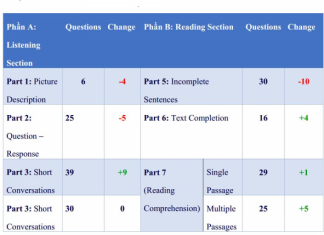Phở bò tiếng anh là Vietnamese beef noodle pho, Beef pho (pronounced “fuh”!). Phở không chỉ là một trong những món ăn truyền thống, tiêu biểu cho ẩm thực Việt Nam mà còn nổi tiếng khắp thế giới.
Chỉ cần bỏ ra 1 chút thời gian và công sức, bạn đã có thể chuẩn bị cho gia đình một món ngon đậm đà, thơm dịu với một chút cay nhè nhẹ không khác gì ngoài hàng.
Hướng dẫn công thức nấu phở bò bằng tiếng Anh rất đơn giản
Đã bao giờ bạn tự hỏi liệu “Món phở bò được nấu như thế nào qua cách hướng dẫn bằng tiếng Anh” để bạn có thể giới thiệu nó đến các bạn bè ngoại quốc của mình ?
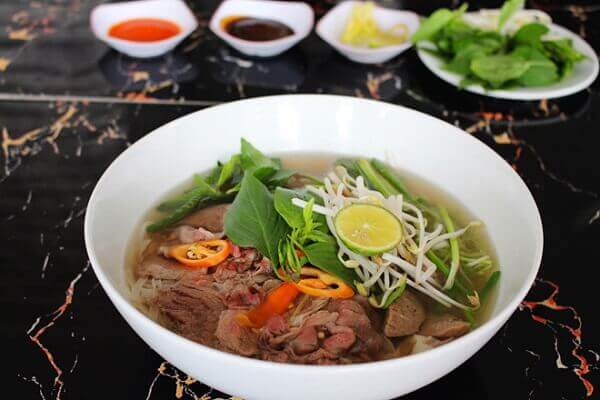
Không phải ngẫu nhiên phở lại được các đầu bếp hàng đầu thế giới bình chọn là món ăn nên thử ít nhất 1 lần trong đời.
Đằng sau mỗi tô phở ấy là một hương vị đặc trưng khó mà lẫn lộn. Tuy phở là món ăn ai cũng có thể nấu nhưng không phải ai nấu cũng ngon. Dưới đây là công thức nấu phở bò thơm ngon mà lại đơn giản và dễ làm.
Cách nấu phở bò ngon là cách nấu của những lão niên cao tuổi miền Bắc, nắm trong tay công thức nấu gia truyền.
Có 2 giả thuyết về nguồn gốc phát tích của món phở, một là phở có nguồn gốc từ Hà Nội rồi được lưu truyền ra khắp cả nước, hai cho rằng phở bò xuất hiện đầu tiên ở vùng Nam Định.
Hiện nay còn nhiều tranh cãi tuy nhiên không thể phủ nhận rằng cách nấu phở bò ngon chính từ những “nghệ nhân nấu phở” có gốc tích từ 2 vùng trên.
Hôm nay bạn hãy cùng học qua cách nấu phở bò bằng tiếng Anh ngay sau đây để có thể giới thiệu món Phở bò này đến bạn bè năm châu nhé!
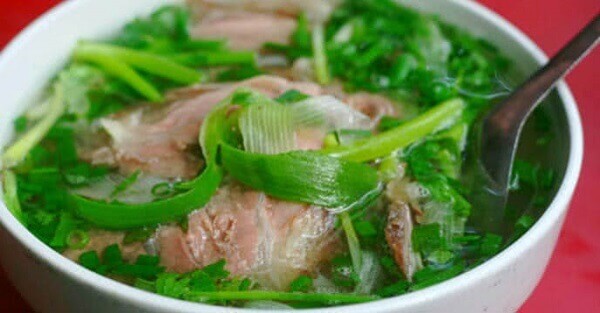
Đôi điều về món phở bò truyền thống ẩm thực Việt
Ngày xưa làm bánh phở phải chọn thứ gạo mùa, gạo chiêm từ vụ trước, để cho hết nhựa, đem nghiền bằng cối xay đá. Có như thế bột mới trắng, mới dai, đem tráng mỏng trên nồi nước quạt than củi cho chín nục.
Thời đó ngay chọn gạo để làm bánh phở cũng chỉ đích danh thứ gạo tấm vì hạt gạo gãy 2/3, làm rất dai, trắng và thơm nục.
Còn thịt bò để làm phở là súc thịt lấy từ con bò trưởng thành, nặng khoảng 3- 4 tạ/con. Loại ấy xả thị chỉ còn khoảng 2,5 tạ thịt, xương cốt mới cho được thứ nước ngọt của tuỷ, ngọt cốt, ngọt tịnh chứ không phải ngọt của mì chính …
Muốn có nồi nước dùng trong luộc nước đầu, vớt ra rửa sạch, sau đó mới lấy làm nước dùng, vì thế không có váng và trong veo.
Nước phở càng ngọt, càng trong bao nhiêu thì phở càng ngon bấy nhiêu. Đặc biệt cần lưu ý là hạn chế cho muối vào nước phở, vì cho muối nhiều thì nước phở sẽ bị chát. Chỉ cần cho muối thật ít để giữ được vị mặn, thay cho muối là nước mắm.
Nước mắm phải là loại thơm ngon để giữ được độ trong của nước phở. Ngược lại nếu nước mắm không ngon, hay có màu thì nước phở sẽ bị gắt, bị vẩn đục và kém ngọt.
Để cho nước phở ngon hơn khi hầm nhừ xương thì hãy cho ít gừng, ít sá sùng, hành khô…. Ngay cả luộc thịt cũng là một “nghệ thuật” không hề đơn giản.
Thịt bò làm phở phải tươi sống và rửa thật sạch. Khi luộc thịt bò, nước sôi và có nhiều bät nổi lên thì phải vớt hết bọt ra để thịt bò khỏi bị chát.
Thịt chín rồi thì không được vớt ra ngay mà phải để nguyên trong nồi khoảng một tiếng, sau đó vớt ra treo lên cao cho khô nước rồi mới cho gia vị vào ướp. Làm như vậy thịt bò mới thơm ngon mà không bị bở.
Các bước nấu phở bò bằng tiếng Anh như thế nào – How To Make Quick Vietnamese Beef Noodle Pho
Vietnamese beef noodle pho is an easy soup to fall in love with. Those chewy noodles, that savory broth, the tender slices of beef — all those crunchy, spicy, herby garnishes we get to toss on top. On a cold evening, after a rough day at work, when we’re sick, on a lazy weekend afternoon — a bowl of piping hot pho is pretty much always a good idea.
Beef pho (pronounced “fuh”!) feels like a restaurant staple, but it’s not actually all that hard to make a quick version at home. This recipe for quick Vietnamese beef pho was one of our favorites from ; so much so that we wanted to walk you through how to make it, step by step.
The Best Beef for Pho
Top choices for beef pho are sirloin steak, round eye, or London broil. All of these are quick-cooking pieces of beef that won’t leave you chewing for hours. My favorite of the bunch is round eye, which is what I’ve used today — this cut is leaner than sirloin and I like its beefy flavor, especially in this pho.
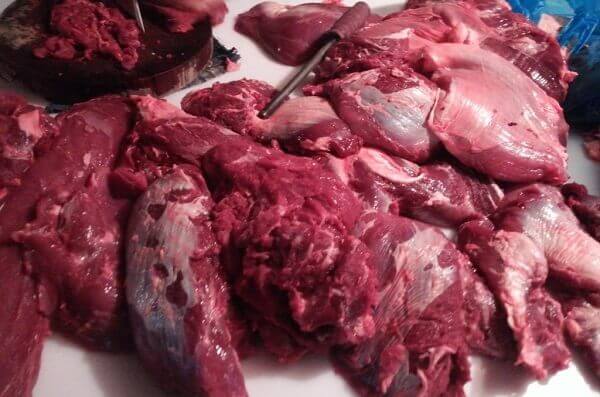
Ingredients: stock
Ingredients: to serve
Equipment
Instructions
– Prepare the onions and ginger: Peel the onions and cut them into quarters through the root. Peel the ginger and slice it into quarters down its length.
– Char the onions and ginger: Using tongs, char the onions and ginger on all sides over high flame on a gas stove, or on a baking sheet placed directly under the broiler (about 5 minutes on each side) — until the onions and ginger pieces show charred spots. Rinse the pieces under cool water to remove any loose, gritty, overly charred bits.
– Dry-roast the spices: Place the cinnamon, star anise, cloves, and coriander seeds in the bottom of a dry 2-quart saucepan and dry-roast over medium-low heat for 1 to 2 minutes, until toasty and very fragrant. Stir frequently to prevent the spices from scorching.
– Combine the broth ingredients: To the pan with the spices, add the broth, soy sauce, fish sauce, chopped carrots, and the charred onions and ginger.
– Cover and simmer the broth: Bring the broth to a boil over medium-high heat, then reduce the heat to medium-low. Cover and continue simmering for 30 minutes to give time for all the spices and aromatics to infuse in the broth.
– Freeze the beef for 15 minutes: While the broth is simmering, put the beef on a plate, cover with plastic wrap, and freeze for 15 minutes. The edges of the beef should feel firm to the touch, but the beef should not be frozen through. This will make it easier to slice the beef thinly.
– Slice the beef into thin slices: Remove the beef from the freezer and immediately use your sharpest knife to slice the beef into very thin slices. Slice across the grain, and aim for slices no thicker than 1/4-inch. Once sliced, keep the beef covered and refrigerated until ready to serve.
– Cook the rice noodles: Bring a second saucepan of water to a boil, drop in the rice noodles and cook according to package instructions (typically 1 minute for very thin noodles and up to 4 minutes for wider noodles).
– Strain the noodles and run them under cool water to stop cooking. The noodles will start to stick together after cooking, so either divide them immediately between serving bowls or toss them with a little neutral-tasting oil to prevent sticking.
– Prepare the rest of the pho toppings: Thinly slice the scallions and the chili pepper. Cut the lime into wedges. Place the bean sprouts in a serving dish. Roughly chop the herbs or tear them with your hands. Arrange all the toppings on a serving dish and place it on the table.
– Strain the broth: When the broth is ready, set a strainer over another bowl or saucepan, and strain the solids from the broth. Discard the solids.
– Place the broth back over low heat and keep it just below a simmer — you should see a fair amount of steam, but the broth should not be boiling. The broth needs to be quite hot to cook the beef.
– Prepare the pho bowls: If you haven’t already done so, divide the noodles between serving bowls and top with a few slices of raw beef. Arrange the beef in a single layer so that the slices will cook evenly in the broth; slices that are stacked or clumped may not cook all the way through.
– Ladle the hot broth over top: Ladle the steaming broth into each bowl, pouring it evenly over the beef in order to cook it. The beef should immediately start to turn opaque. Fill each bowl with as much broth as desired.
– Serve the pho with toppings: Serve the pho at the table and let each person top their bowl as they like.
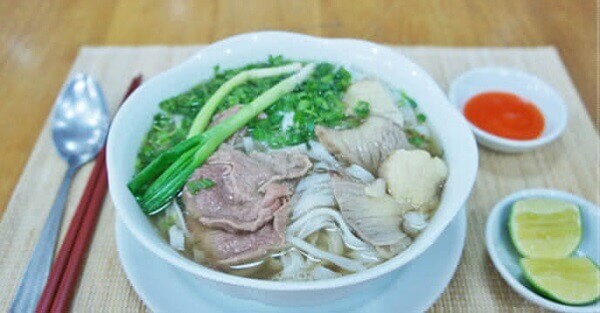
Recipe Notes
– Vegetarian pho: Use vegetable stock or broth and skip the fish sauce. Instead of slices of beef, top the pho with tofu, seitan, mushrooms, bok choy, broccoli, or other vegetables. See here for a full recipe: Vegetarian Pho.
– Make-ahead moments: The broth can be prepared and kept refrigerated for 5 days or frozen for up to 3 months. The beef can be sliced and kept refrigerated for several hours (no longer than 24 hours). The noodles can be prepared, tossed with a bit of neutral-tasting oil, and kept refrigerated for up to a day before serving. The toppings can also be prepped up to a day ahead and kept refrigerated until serving.
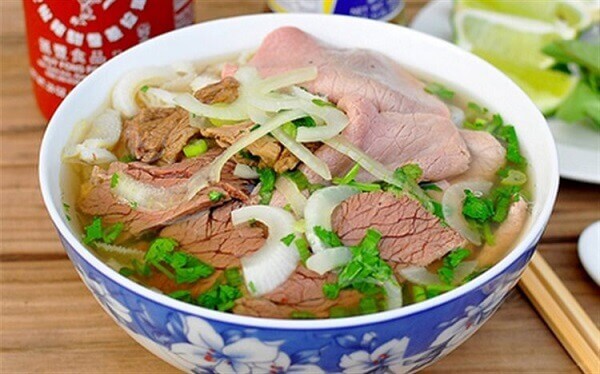
– Storing leftovers: Leftover noodles stored in broth will ultimately absorb all the broth and become gummy. If you have leftovers, store the noodles, the broth, the beef, and the toppings in separate containers.
– Raw slices of beef will keep for a day or two; they can also be quickly cooked in hot broth and then kept refrigerated for up to 5 days. When reheating, assemble the noodles, beef, and broth in a bowl and microwave; top with garnishes before serving.









